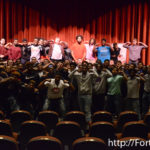Former Fort Scott Community College student and football player Robert McField revisited the campus Thursday evening, when he gave an inspirational presentation of his life and what he has overcome, encouraging his audience to never let circumstances keep them from their goals.

Growing up in St. Louis, McField said football became a key part of his life, even keeping him out of trouble in high school.
But only eight months into his commitment to play for the University of Minnesota, a time when McField said he surrounded himself with negative influences, then-teen McField was arrested for armed robbery and sentenced to 12 years in a maximum security prison.
“I couldn’t blame anybody but myself,” McField said, though he added he could have tried to play the victim like others around him.
Instead, a couple years into his sentence, just after turning 21 years old while in isolation for fighting with a fellow inmate, McField penned the phrase “Too Big to Stop.” That line became his motto, not because of his size which made him an outstanding defensive end, but because he was determined to overcome his poor choices and reach his dreams and goal of returning to the field.
After serving four years, from 2007 to 2011, McField was released on parole. When that end was in sight, McField said his mother began reaching out to colleges to see if any would allow him to join their teams.
After contacting 30 teams, she finally received a response from then-coach Jeff Sims of FSCC, who recruited him even while he was in prison. Just 19 days after his release, McField was at FSCC, where he played for the season and was even named an all-conference player.
“I had fun at Fort Scott,” McField said of his time there.
McField went on to play at Pittsburg State University, but began to notice he was experiencing severe pain as he continued playing. He had already had five athletic-related surgeries in his football career, but this discomfort increased until he finally sought medical help after waking up to pain shooting through one arm, only a month after the football season had ended.
McField learned he had stage four cancer and had been playing football with five tumors in his body, including one in his stomach that was the size of a deflated football and another that had almost cut off his windpipe, which would likely have killed him.
“That let me know I was here for a reason,” McField said when he came to the realization that he could have died without even knowing he had cancer.
After six months of intense treatment, the cancer was in remission, but McField learned the tumor in his neck had caused enough damage to his spine that he would not be able to play football again. While that dream had become an impossibility, McField set a new goal of reaching out to other young athletes and students to encourage and inspire them.
For the past two years, McField has visited a number of high schools and colleges to speak about his experiences.
At FSCC Thursday, McField spoke of boxes of limitations, struggles and poor choices that each person has, saying they could include cancer, surgeries and imprisonment as it did for him, or other struggles such as fatigue, doubt, fear and lack of confidence.
“You are the person that’s holding you back,” McField said, saying none of those limitations should prevent them from achieving their goals in life.


